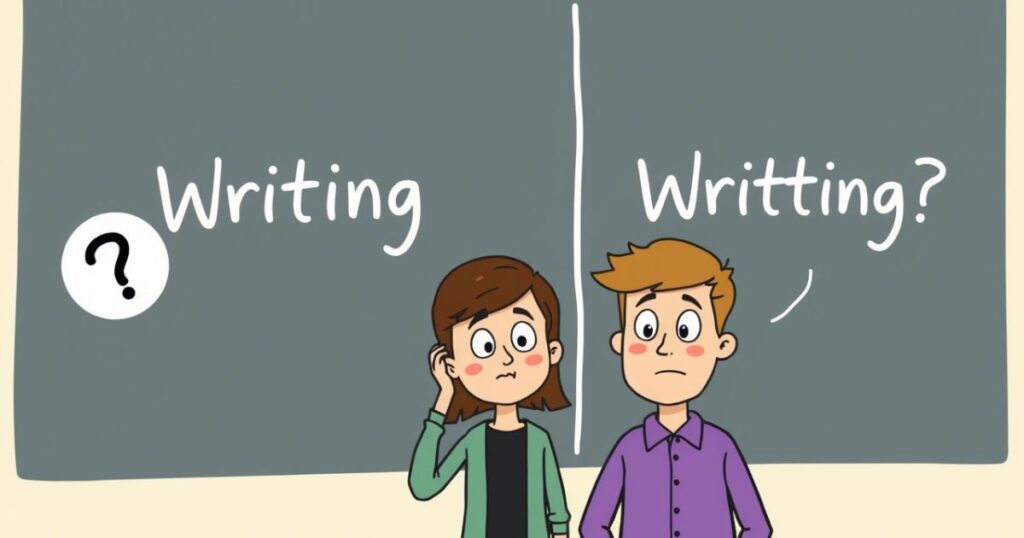When it comes to the words “Writing or Writting,” many people often wonder which spelling is correct. The confusion between “writing or writting” happens because both words sound the same but are spelled differently. However, the correct spelling is “writing,” with only one “t.” The misspelling “writting” is common, but it’s important to remember that the proper form is “writing.” Understanding the spelling of writing or writting is essential to avoid making this common mistake in your writing.
Knowing the correct spelling of writing or writting can help improve your writing skills. When you are unsure about the spelling of writing and writting, simply remember that “writing” is the right version. So, next time you are writing or wondering about the spelling of writing or writting, use “writing” to ensure accuracy. The spelling of writing and writting may seem tricky, but it’s easy to remember once you know the rules.
Why Is There Confusion?

The confusion between “writing” and “writting” often arises because both words sound similar, yet only one is correct. “Writing” is the proper form, with only one “t,” while “writting” is a common misspelling. English, with its mix of rules and exceptions, frequently leads to this type of confusion, especially when words are phonetically similar but differ in spelling.
Another factor that contributes to this confusion is how English speakers tend to double consonants in words like “hitting” or “bitting,” leading to the incorrect assumption that “writing” should follow the same pattern. However, “writing” is an exception, and it’s important to remember that the correct spelling has only one “t.”
What Does “Writing” Truly Mean?
“Writing” refers to the act of expressing thoughts, ideas, or information through marks, symbols, or letters on a surface. This can range from simple handwriting to more complex forms like typing or digital content creation. Writing is a crucial skill used to communicate in nearly every aspect of life, from personal letters to professional reports and creative works.
Beyond the physical act of writing, it also carries a deeper meaning: it’s about organizing ideas and telling stories, sharing knowledge, or documenting events. Writing serves as a tool for both expression and record-keeping, playing an essential role in preserving culture and advancing human understanding.
Words Following the Rules as Of “Writing”:
| Base Word | Present Participle |
| Write | Writing |
| Eat | Eating |
| Run | Running |
| Swim | Swimming |
| Jump | Jumping |
| Sing | Singing |
| Dance | Dancing |
| Play | Playing |
| Speak | Speaking |
| Read | Reading |
| Laugh | Laughing |
| Drive | Driving |
| Walk | Walking |
| Work | Working |
| Sleep | Sleeping |
Synonyms of “Writing”
- Composition – Refers to the act of creating written work, often in the form of essays or articles.
- Script – A written version of a speech, performance, or dialogue.
- Text – A general term for any written or printed material.
- Manuscript – A document written by hand or typed, often referring to an unpublished work.
- Draft – A preliminary version of a written work that is subject to revision.
- Work – A written creation, typically referring to literary or academic endeavors.
- Inscription – Writing or engraving on a surface, typically for permanent records.
- Document – A written or printed record, especially a formal or legal one.
- Article – A written piece, typically for a publication or news source.
- Report – A structured document presenting information on a specific topic or event.
- Correspondence – The act of writing letters or emails for communication.
- Note – A brief written message or record.
- Journal – A daily or regular record of thoughts, events, or observations, often personal.
- Essay – A short piece of writing that explores a particular topic.
- Prose – Written or spoken language in its ordinary form, without metrical structure.
Related Guide:
Metaphor vs Hyperbole: Explained with Examples
Sentences Using “Writing”
- She spends hours each day writing in her journal about her adventures.
- The professor is known for his excellent writing on environmental issues.
- Writing in cursive is becoming less common in schools today.
- After years of writing novels, he decided to try his hand at screenplays.
- His writing style is simple but profound, making complex ideas easy to understand.
- Writing letters to friends helps her maintain strong connections across the globe.
- The teacher assigned writing exercises to improve the students’ grammar skills.
- Writing a report on the latest project took longer than expected.
- She was recognized for her creative writing at the annual literary awards.
- Writing the proposal was challenging, but it was ultimately a rewarding experience.
- Writing down your goals is the first step toward achieving them.
- His writing was so compelling that it captivated readers from the first page.
- Writing reviews for books has always been a passion of hers.
- The author spent years writing her historical fiction novel before it was published.
- Writing for the school newspaper taught him valuable lessons in journalism.
Etymology of “Writing”
The word “writing” comes from the Old English word “writan,” meaning “to inscribe or draw.” This term was used to describe the physical act of marking something down, a concept that dates back to the early forms of written language. Over time, the meaning expanded to include the creation of texts, documents, and literary works.
The evolution of the word “writing” reflects the development of language itself. From its roots in Proto-Germanic and Proto-Indo-European, it evolved through centuries of usage, shaping the modern understanding of writing as not just an act of marking symbols, but a fundamental form of human communication.
Common Mistakes in Spelling “Writing”
- Writting – A common mistake where people add an extra “t,” thinking it follows the pattern of other words like “hitting” or “sitting.”
- Writng – Omitting the “i” is another frequent typing error, often happening in fast writing or when proofreading is skipped.
- Writng vs. Writing – Confusion may arise from a mental mix-up between words that contain double consonants and those that do not, like “writing” and “sitting.”
- Incorrect autocorrect – Sometimes, autocorrect systems might change “writing” to a different form like “writting” if the user isn’t attentive.
- Learning English – Non-native English speakers might be more prone to errors like “writting” due to the rules of their native languages influencing their English spelling.
- Overlooking proofreading – Many writers skip proofreading, leading to mistakes like “writng” that could be caught with a quick review.
- Typographical error – Simple typing mistakes, especially when typing quickly, may lead to “writting” instead of “writing.”
- Phonetic confusion – Some people might incorrectly assume that because “writing” sounds like “hitting,” it should follow the same spelling pattern.
- Autocorrect confusion – In informal settings, quick typing on smartphones may lead to spelling errors like “writting” due to predictive text suggestions.
- Visual similarity – The close visual similarity between “writing” and “writting” can cause writers to make mistakes when looking at the word in quick succession.
How Writing Shapes Creativity and Thought

- Stimulates Idea Generation – Writing helps individuals brainstorm and generate new ideas, stimulating creativity.
- Organizes Thoughts – Writing forces individuals to organize their thoughts, leading to clearer and more structured ideas.
- Unlocks New Perspectives – Writing encourages individuals to explore and view topics from different angles, promoting creative thinking.
- Enhances Problem-Solving Skills – Writing helps break down complex problems, offering creative solutions through logical thought.
- Improves Cognitive Development – The act of writing fosters mental growth, improving language skills and overall cognitive abilities.
- Fosters Reflection – Writing encourages introspection, which helps individuals connect with their thoughts and emotions on a deeper level.
- Builds Confidence – As individuals develop their writing skills, they gain confidence in their ability to communicate and express themselves creatively.
- Nurtures Personal Growth – Writing fosters self-discovery, helping individuals learn more about themselves and their capabilities.
- Encourages Exploration – Writing pushes individuals to explore new topics, delve into research, and discover uncharted territories of knowledge.
- Stimulates Imagination – Writing ignites the imagination, especially when composing fictional works or creative narratives.
FAQ’s
What is the correct form, Writing or Writting?
The correct form is “writing” with a single “t.” Many mistakenly use “writting,” but remember, only one “t” is needed for the proper spelling.
How can I avoid confusion between Writing and Writting?
When you write, simply recall that “writing” is the correct choice. Avoid adding an extra “t,” as this is the common mistake made with “writting.”
Why do people often mix up Writing or Writting?
The confusion arises because both “writing” and “writting” sound the same. However, the extra “t” in “writting” is incorrect and commonly misused.
How can I remember the correct spelling of Writing and Writting?
Just remember, there is only one “t” in “writing.” It helps to practice using the word correctly in your writing to build the right habit.
Does the spelling of Writing or Writting affect my writing?
Yes, using the correct spelling of “writing” enhances the clarity and professionalism of your work. Incorrect spellings like “writting” can lead to confusion.
Conclusion
The correct spelling is “Writing,” not “Writting.” Many people get confused about the spelling of writing or writting, but once you remember that “writing” only has one “t,” it becomes much easier to get it right. The spelling of writing and writting is a simple rule to follow, and knowing the difference can make your writing more polished. If you’re ever uncertain about the spelling of writing or writting, just remember that “writing” is the correct form.
Understanding the spelling of writing or writting is key to writing clearly and accurately. Whether you’re writing an essay or a quick note, knowing the proper spelling of writing or writting helps avoid mistakes. The spelling of writing or writting might seem tricky, but it’s easy to remember once you understand the correct usage. So, when you’re unsure about the spelling of writing and writting, always choose “writing” for accuracy.

Ember Rose is a dedicated administrator with 4 years of experience in efficient operations management and team leadership. Skilled in streamlining workflows and enhancing productivity.

